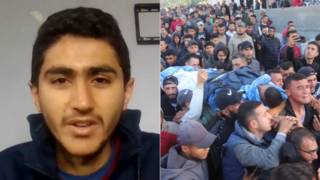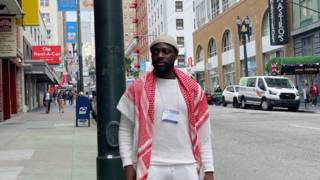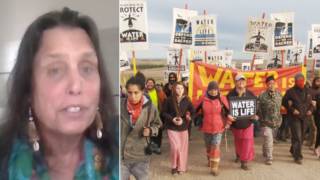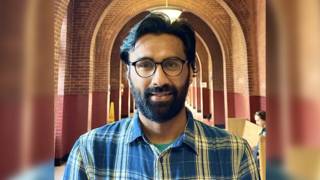
Topics
Guests
- Aji Piper15-year-old Seattle resident and a member of Earth Guardians’ Rising Youth for a Sustainable Earth. He is one of the youth plaintiffs in the landmark lawsuit filed by Our Children’s Trust.
- Julia Olsonexecutive director and chief legal counsel for Our Children’s Trust, which has filed a landmark lawsuit on behalf of 21 young people all under the age of 21. The lawsuit alleges the government has failed to take necessary action to curtail fossil fuel emissions.
A federal judge in Oregon has rejected an attempt by the U.S. government to dismiss a landmark lawsuit over the government’s failure to take necessary action to curtail fossil fuel emissions. The lawsuit was filed by Our Children’s Trust on behalf of 21 young people—all under the age of 21. They argue that the federal government is violating their constitutional rights to life, liberty and property by enabling continued exploitation, production and combustion of fossil fuels. In his ruling, Judge Thomas Coffin wrote, “If the allegations in the complaint are to be believed, the failure to regulate the emissions has resulted in a danger of constitutional proportions to the public health.” We speak to plaintiff Aji Piper, a 15-year-old 10th grader, and Julia Olson, executive director and chief legal counsel for Our Children’s Trust, which filed the lawsuit.
Transcript
AMY GOODMAN: This is Democracy Now!, democracynow.org, The War and Peace Report. I’m Amy Goodman. We’re on the road as part of a 100-city tour, now at Stanford University in California. We are moving on to, oh, today, Pitzer College. I’ll be speaking at noon, and then this evening in Los Angeles. And we’re moving on to Northern California over the weekend. You can check democracynow.org.
But we’re talking further north right now. A federal judge in Oregon has rejected an attempt by the U.S. government to dismiss a landmark lawsuit over the government’s failure to take necessary action to curtail fossil fuel emissions. The lawsuit was filed by Our Children’s Trust on behalf of 21 young people—all under the age of 21. They argue the federal government is violating their constitutional rights to life, liberty and property by enabling continued exploitation, production and combustion of fossil fuels. In his ruling, Judge Thomas Coffin wrote, quote, “If the allegations in the complaint are to be believed, the failure to regulate the emissions has resulted in a danger of constitutional proportions to the public health.” Judge Coffin’s decision was welcomed by the youth plaintiffs, who vowed to continue with their legal fight against climate change. Plaintiff Xiuhtezcatl Tonatiuh, a 15-year-old from Colorado, reacted to the ruling.
XIUHTEZCATL TONATIUH MARTINEZ: We’ve been in this frickin’ crazy lawsuit. We sued the government. All my kids at school are like, “Oh, my god, Xiuhtezcatl, you sued the president?” I’m like, “Yeah.”
VICTORIA BARRETT: We did. We actually did it.
XIUHTEZCATL TONATIUH MARTINEZ: We did it. And we were just in court in Eugene, Oregon. The fossil fuel industry stood with the federal government to try to get our case dismissed, thrown out of court. This was what happened the last lawsuit we filed, but this one’s way stronger. It has to do with the Constitution, demanding the courts to enforce climate recovery plans upon our government to massively cut carbon for our future, to honor our constitutional right to life, land and liberty. And so, we went to court, because they wanted to dismiss this case. And Judge Coffin ruled in our favor.
VICTORIA BARRETT: And he was like, “Nah, chill. Don’t do that.”
XIUHTEZCATL TONATIUH MARTINEZ: And he did not dismiss. “Nah, nah.” He ruled in the favor of the young people rather than with big money and the government.
AMY GOODMAN: That was teenage plaintiff Xiuhtezcatl Tonatiuh, one of the 21 young people suing the U.S. government for its alleged failure to curtail fossil fuel emissions. For more, we’re joined now by the lawyer and another of the youth plaintiffs in this landmark lawsuit. Julia Olson is executive director and chief legal counsel for Our Children’s Trust, which has filed the lawsuit on behalf of 21 young people, all under the age of 21. And Aji Piper joins us, one of the plaintiffs, 15 years old, in the 10th grade in Seattle, Washington. He is a member of Earth Guardians’ Rising Youth for a Sustainable Earth council.
Julia Olson, Aji Piper, welcome to Democracy Now! Aji, why have you brought this suit?
AJI PIPER: We brought this suit to protect our constitutional rights to life, liberty and freedom, as stated under the public trust doctrine, which basically says that the government has an obligation to protect the air, land and water for future generations. And they’re allowance of fossil fuel industry to come and, you know, do things like fracking or other fossil exploitations, that destroys the land, and it harms the air, and that’s why we’re suing them.
AMY GOODMAN: And how you—how did you get involved with this issue?
AJI PIPER: So, I am already a plaintiff on a Washington case that is currently ongoing, and because I was involved with that and RYSE—
AMY GOODMAN: What’s that case?
AJI PIPER: That case is us, we sued the Department of Ecology in Washington, because when we petitioned for a rulemaking for new emissions reductions rules in our state, they denied our petition. And so, we were like—so we took them to court. And right now, they stopped their rulemaking, so we’re going back to court. And we were permitted by the judge another oral argument.
AMY GOODMAN: Julia Olson, you are the head of Our Children’s Trust. What is that? And talk about the judge’s ruling?
JULIA OLSON: Yeah, so there’s multiple cases going on. And what Our Children’s Trust does is help elevate the youth voice by connecting them with attorneys who help them sue their governments for acting in ways that are destroying the climate system. So, the decision last Friday is a remarkable decision. There’s really not been anything like it yet. It’s very exciting. And it’s about protecting, as Aji said, these young people’s constitutional rights to life, liberty and property and to their public trust resources. And—
AMY GOODMAN: What was unusual about Judge Coffin’s ruling?
JULIA OLSON: What’s unusual about it is that the court has said that the case can go forward, and it will be the first time that the federal government’s fossil fuel policies will really be looked at in accordance with the Constitution and their obligations to protect young people and future generations.
AMY GOODMAN: What’s the Eugene Climate Recovery Ordinance?
JULIA OLSON: The Eugene Climate Recovery Ordinance is a law that young people, including some of the federal plaintiffs in our case, took before City Council in Eugene and, over a year-long campaign, convinced the City Council to adopt an ordinance that mandates specific emission reductions and a reduction in fossil fuel consumption at the local level. It also requires that the city prepare a carbon budget based on Dr. Hansen’s prescription to return CO2 levels to 350 parts per million by the end of the century. It’s really a groundbreaking ordinance and the first of its kind.
AMY GOODMAN: Aji, as a young person, what concerns you most about climate change?
AJI PIPER: What concerns me most about climate change is—I mean, it’s a very, like, hard thing, because you have to imagine, like, the future. And we know, like, if we don’t act on climate change, the world is not going to, like, end in like a flash and a bang. But what will end up happening is either my generation will feel the effects, where we have to fight for survival. On the Earth, you know, life will be very, very different. It won’t be like—we won’t be as privileged to live on the Earth. It will be a lot harder. But then also you think about, you know, we’re putting generations that haven’t been born yet and generations to come in the position where they have to deal with that, and that’s not a position anybody should be put in. And it’s just not fair. So it’s a moral, logical thing.
AMY GOODMAN: I wanted to go back to Eugene’s Climate Recovery Ordinance, that holds governments accountable for carbon-neutral city operations by 2020, half—50 percent less community fossil fuel consumption by 2030, citywide carbon budget and science-based emission reductions to reach 350 parts per million carbon dioxide. Youth environmentalists were crucial in passing Eugene’s Climate Recovery Ordinance, and I want to turn to a nine-year-old, Tayo Olson, who testified in Eugene, Oregon.
TAYO OLSON: Last night, me and my class went on a field trip to watch salmon spawn. And if climate change gets any worse, that won’t be able to happen. Tonight, we will be giving you the ordinance for climate recovery and as soon as possible put climate change on the agenda.
AMY GOODMAN: Where is that now, Julia Olson?
JULIA OLSON: The Climate Recovery Ordinance? So, right now, the city is working on implementation. And it’s taking a lot of citizen engagement to continue to put pressure on the city. And the youth are right there at every City Council meeting, talking to the city about it. They have developed the 350 carbon budget, and so now we’re really working on how do we implement that at the local level.
AMY GOODMAN: I want to ask about a new article from InsideClimate News, the Pulitzer Prize-winning news organization. It’s called “CO2’s Role in Global Warming Has Been on the Oil Industry’s Radar Since the 1960s.” According to the article, “The oil industry’s leading pollution-control consultants advised the American Petroleum Institute in 1968 that carbon dioxide from burning fossil fuels deserved as much concern as the smog and soot that had commanded attention for decades.” At the time, Stanford Research Institute scientists Elmer Robinson and R.C. Robbins wrote a paper to the American Petroleum Institute that said carbon dioxide was, quote, “the only air pollutant which has been proven to be of global importance to man’s environment on the basis of a long period of scientific investigation.” Your response, Julia?
JULIA OLSON: Yeah, it’s really interesting, because that issue is central to the case that is now poised in the district court in Oregon against the federal government and the fossil fuel industry. We have evidence that since 1965, and even the late '50s, the federal government has known that by continuing to extract and burn fossil fuels, that it would cause catastrophic consequences for future generations. So I think the information of the fossil fuel industry actually is predated by knowledge by our federal government. And in collusion, both the fossil fuel industry and our federal government have been causing climate change through their acts. And so that's exactly what’s at issue in this federal case. And so, those facts—the collusion, the destruction of the climate system—is what we will present in trial in Oregon.
AMY GOODMAN: I want to end with the voices of some of the youth affiliated with Our Children’s Trust expressing their concerns about climate change. And I want to thank Aji Piper and Julia Olson for being with us.
TAYO OLSON: My name is Tayo. Climate change means more droughts and less water for swimming and drinking and animals.
JESSE: My name is Jesse. I care about stopping climate change because I want clean air.
RAY: My name is Ray. I want—we want to keep polar bears alive.
OSCAR: My name is Oscar. I care about climate change because it’s good for the animals.
UNIDENTIFIED: We want the next generation to live a healthy—to be healthy, live in a healthy environment and eat good food.
AMY GOODMAN: This is Democracy Now!, democracynow.org, The War and Peace Report. When we come back, Stanford University students are challenging the administration over bringing more diversity to their university. Stay with us.
[break]
AMY GOODMAN: That’s “Danger,” sung by Aji Piper, the guest who has brought a lawsuit against the U.S. government.












Media Options